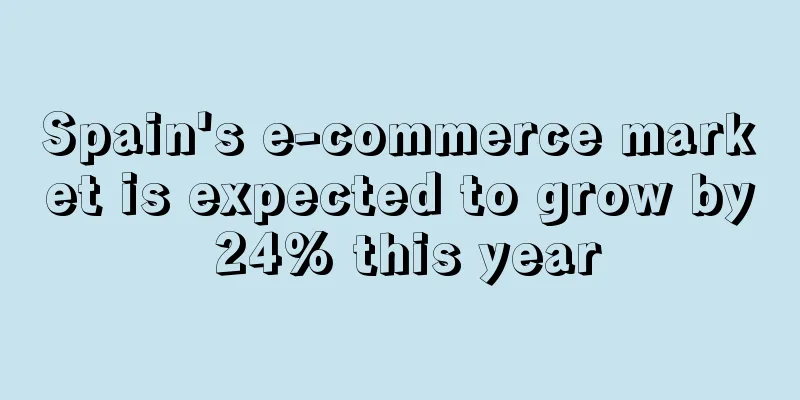Spain's e-commerce market is expected to grow by 24% this year

|
On July 20, according to foreign media reports, the growth rate of the Spanish e-commerce market has slowed down compared with 2020, but the growth rate is still expected to reach 24% this year, and the average e-commerce expenditure will be between 40,000 and 45 million euros.
The survey shows that as the COVID-19 pandemic has eased, the growth rate of Spain's e-commerce market has slowed down, but it is expected that at least 80% of Spaniards will still participate in online shopping this year .
Currently, the population of Spain is about 25.8 million, with an online shopping penetration rate of 76%. They shop online an average of 3.8 times a month, compared with 3.5 times a month in 2020 and 3 times a month in 2019.
In addition to the increase in the frequency of online shopping, the average online shopping expenditure in Spain has also increased. According to statistics, the average online shopping expenditure of Spaniards is currently 68 euros (68 euros in 2020 and 64 euros in 2019). Among them, technology/communication (60%), entertainment and culture (59%), food (56%) and fashion products (56%) are the most sold product categories in Spanish e-commerce this year.
It is worth noting that online shopping is more popular among young people. Among all age groups, Spanish young people under the age of 34 make the most online purchases, with a penetration rate of 83%.
However, young people in Spain do not simply shop online. Many of them also choose to shop in a combination of offline and online methods, and the proportion of people who choose this consumption method is further increasing.
In addition, the survey shows that in the post-epidemic era, there is a gradual trend of using virtual assistants for shopping in Spain. Compared with 2020, the number of transactions using virtual assistants in Spain is increasing significantly, up 6 percentage points from the previous year.
Among them, 37% of users have experience using virtual assistants, and 22% said they have completed shopping with the help of virtual assistants.
At present, Spanish e-commerce is in a stage of vigorous development, but some problems are inevitable, such as the incomplete supervision of online stores, which leads to the leakage of customer information and causes harm to consumers. In response, Spain plans to promulgate a series of e-commerce laws to regulate the market.
Spain E-commerce Online shopping |
<<: Attention! Typhoon landed, Yantian and Shekou ports stopped container delivery services
Recommend
Amazon blocks sellers from selling goods due to loopholes in "platform policy"
Recently, a seller on Amazon's official forum...
Attention! AliExpress releases annual sales assessment criteria for sellers
Recently, the official website of AliExpress rele...
What is ESTONE? ESTONE Review, Features
Shenzhen Yishitongda Technology Co., Ltd. (formerl...
How much can you earn from selling on Amazon with 10 million? These hidden costs cannot be ignored!
At the beginning of the new year, many people sta...
What is Hpyerwallet? Hpyerwallet Review, Features
Hyperwallet is a global payment service provider....
Big mistake! Woman bought a well-known brand belt but received the same one from SHEIN
In the fast fashion industry, many brands are act...
Shopify and the Detroit Pistons launch SHOP313 to help small and medium-sized enterprises grow
The Detroit Pistons and Shopify are joining force...
What is China Merchants Logistics (CTS)? China Merchants Logistics (CTS) Review, Features
China Merchants Logistics (Hong Kong China Travel ...
Winter storm hits North America, consumer demand and retail sales decline
U.S. retail sales fell in February as severe wint...
What is Expand ERP? Expand ERP Review, Features
<span data-docs-delta="[[20,{"gallery"...
What is the Value Chain
Shenzhen Jiazhilian Cross-border E-commerce Co., ...
What is Sellery
Sellery is a simple app that gives you control ov...
What is Anbohang? Anbohang Review, Features
Anbohang (Anbohang Supply Chain Management Shangha...
What is Yiwu Rongpeng Culture Media Co., Ltd.? Yiwu Rongpeng Culture Media Co., Ltd. Review, Features
Yiwu Rongpeng Culture Media Co., Ltd. focuses on ...
Being elegant and calm, while forging ahead - A conversation with Cindy Tai, Vice President of Amazon Global and Head of Amazon Global Selling Asia Pacific
"Choose to Challenge" is the positive a...









